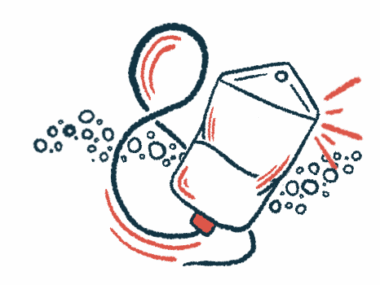When my body raises the alarm, it’s crucial that I pay attention
Living with aHUS has taught me to recognize my warning signs
Written by |

I grimaced, pulling my arm back in reaction to the pain surging through my forearm. I’d bumped a large purple bruise when I lifted a box. Rubbing my hand over the bruise, I wondered, Where did that come from? Come to think of it, I had several new large and dark bruises littering my arms, legs, and hands.
A wave of nausea washed over me, causing me to gulp hard, which only made it worse. I picked up my ice-cold soda but stopped just before the drink reached my mouth. I’d felt nauseous earlier when I took a long swig of my drink.
At that moment, working in the heat, it dawned on me what was happening: My body was raising huge red flags that my already low kidney function was dropping dangerously.
Heeding my body’s warning
It all began in September 2020. An asymptomatic bout of COVID-19 activated an ultrarare disease in my body called atypical hemolytic uremic syndrome (aHUS). The disease nearly killed me, causing kidney and liver failure, permanent heart damage, uterine damage, and myriad comorbidities.
My life was forever changed. Almost five years later, I still need biweekly monoclonal antibody infusions that cause me chemotherapy-like side effects. And my organs are still damaged, leaving me constantly worried.
Before my last infusion, I’d been pushing myself more than usual. It was a Monday, and I had several things I needed to do before my treatment on Wednesday: run errands, unpack some large totes left over from our recent move, shop at several stores, and carry several seasonal items down to our shed.
A healthy person could likely finish those tasks in an afternoon, or at least in one day. But with the permanent damage to my body and continued health complications, I had to spread them out because my stamina was nearly nonexistent.
So I started with the errands. On Monday morning I dropped my kids off at school and headed into town. Two grocery stores, Walmart, the gas station, and the pharmacy were on my list. But I have another complication that adds to my already complicated life: My car has no air conditioning (AC) and I live in Florida.
My body has always struggled to cool itself, as I don’t sweat like normal people do. That puts me at risk of overheating or even experiencing heat stroke. I’m also permanently anemic because of aHUS, so I’m usually cold and love being warm. As a result, it’s harder for me to recognize when I’m overheating.
But spending half the day getting in and out of a hot car causes me to overheat. I’ve had the AC “repaired” three times, to the tune of thousands of dollars, but it still doesn’t work. So all I can do is try to finish my errands quickly and drink plenty of water.
Once at home, I unloaded the car in the heat. My new home is on stilts, so everything has to be carried up three sets of stairs. That’s difficult with my swollen legs, lowered stamina, damaged heart, and uncontrolled hypertension.
I rested after emptying the car and then decided to empty the totes next. That brings me back to the opening of the column — the bruises, the nausea, and now a headache.
My body was giving me clear warning signs. Despite all of the damage it’s endured with aHUS, my body is actually pretty good at signaling impending doom. When my kidney function drops drastically low, I start to have these symptoms.
Soda suddenly tastes weird and makes me nauseous, I have intense migraines and lower back pain, bruises develop all over, and I become insatiably thirsty. All the signs were there, which meant it was crucial for me to rest and hydrate.
By that evening I was nauseous when I ate or drank anything besides water. My ankles were swollen and larger than my feet, and I suddenly had bruises all over my body.
I spent the entire next day resting. I’d absolutely overdone it. It’s frustrating to have a mind that’s healthy and a body that’s not.
As expected, routine lab work at my infusion appointment confirmed that my kidney function had dropped from 21% to 16%. My body had done a great job of raising the alarm.
I’ll always need to listen to my body and watch for such warning signs. Pushing through symptoms is what caused my aHUS to be nearly deadly, so it’s more important than ever that I pay attention to my body and rest when needed.
Note: aHUS News is strictly a news and information website about the disease. It does not provide medical advice, diagnosis, or treatment. This content is not intended to be a substitute for professional medical advice, diagnosis, or treatment. Always seek the advice of your physician or other qualified health provider with any questions you may have regarding a medical condition. Never disregard professional medical advice or delay in seeking it because of something you have read on this website. The opinions expressed in this column are not those of aHUS News or its parent company, Bionews, and are intended to spark discussion about issues pertaining to aHUS.







Leave a comment
Fill in the required fields to post. Your email address will not be published.